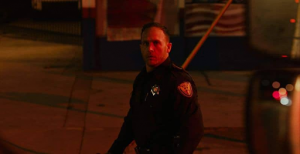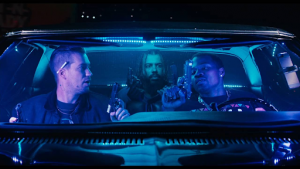81 Blindspotting (2018)
Blindspotting (2018) and Seeing Both Sides of the Picture
By Graham King
“How come every time you come around you monsters got me feeling like a monster in my own town?” Collin, played by Daveed Diggs, screams at a white police officer while pointing a gun at him and fighting back tears. This single line by Collin is a perfect encapsulation of everything Blindspotting is about. From gentrification to police violence, Blindspotting tackles many hard subjects in a way that is able to capture the audience’s attention from start to finish. Directed by Carlos López Estrada and co-written by the co-stars Daveed Diggs and Rafael Casal, this team creates a comedic drama that depicts how difference, power, and discrimination affect the way people live their lives every day. Estrada said in an interview with No Film School that “the whole movie is about perspective and about angles and different people’s understanding of the same events” and Blindspotting explores these perspectives in a very well done and entertaining way.
Having grown up together in Oakland, California, Daveed Diggs and Rafael Casal wanted to make a movie that felt true to Oakland and highlighted certain conditions that they had experienced in their time living there. In an interview with Colorlines, Diggs stated “We decided it should be about the Bay Area and Oakland specifically because we’d never seen it done in the way that we always imagined it to be, and that it should star us. Right about that time, Oscar Grant was killed at Fruitvale BART Station. In telling an Oakland story, that was a part of the story we were telling.” The police shooting of an unarmed black man is one of the narrative elements in Blindspotting, clearly drawing parallels to Oscar Grant’s murder. Diggs and Casal were able to use this event as motivation to complete this multi-year project and setting the movie in Oakland added a new personal level to the experience.

Unlike discrimination and power, which are both easily definable, difference is more complex and has different meanings in different situations. In order to understand difference in the context of this movie, it is necessary to break down the title of the film and what it actually means. As described in the scene between Collin and his ex-girlfriend Val, blindspotting is when a situation or an image can be interpreted in two different ways, but you can only see one of the interpretations. A real-life example could be the boys from the Central Park Five case. While some people may see a group of teenagers joking around in the park, others may see a group of thugs harassing and assaulting people throughout the park. In regard to this movie, while people who know Collin know he is a nice and harmless person, outsiders may assume he is dangerous and violent simply based on his appearance. These different views are all shaped based on everyone’s prior experiences in life and it will affect how they view any given situation. However, even if somebody points out the other side of the picture to you, it doesn’t remove the blindspot. Someone can’t go against what their brain instinctually tells them unless they spend the time to retrain their brain to see the other picture. Estrada also uses editing to highlight differences between characters in the film. During a phone call between Collin and Val, rather than having cuts back and forth whenever one person is talking, Estrada decided he would rather use a split-screen to keep both characters on screen the entire time. This split-screen does a great job of showing that these characters have differing views about their life and what living in Oakland means to them. While Collin is content with staying in Oakland and working as a mover, Val wants to get an education and move on with her life. Additionally, the split-screen ties back into what the entire movie is about and continues to reinforce that everyone has different perspectives on the same situations.
Blindspotting also tackles the issues of power in a more straightforward way. The most prominent issue of power is the relationship between the police officer and the black man who was murdered. The police officer was clearly in power in that situation and killed an unarmed man who was not a threat to anyone around him. Although the cop says that he did not mean to kill him at the end of the movie, there is no guarantee that he wouldn’t do it again due to his blindspot. Another issue of power is how people who become convicted felons have that title hung over their heads for the rest of their life. An example from the movie is when the landlord says “You are a convicted felon, Mr. Hoskins. You are now that until proven otherwise. Prove otherwise at all times.” This is something that is applicable to felons in the real world as well. As the documentary 13th described, once you are incarcerated once, you have so many of your rights taken away and there is a figurative scarlet letter placed on you that everybody you met for the rest of your life will judge you on. More specifically, felons lose their right to vote, their right to bear arms, their right to travel abroad, and lastly, it is not illegal for employers to refuse to hire a felon. Being incarcerated once puts you in a powerless position for the rest of your life and allows for other people to trample all over you because they know there is nothing you can do about it.

The last topic that Blindspotting talks about is discrimination. Other than the obvious discrimination that the police officer displays when he shot the unarmed black man, there are other more subtle moments that discuss discrimination. For example, during one of the scenes Collins’s ex-girlfriend, Val, tells Collin that he should consider changing up his look and cutting his hair because he looks like a criminal. This moment highlights how people will often place blame on the person they assumed did it based on race and appearance. People will often associate certain looks with crime and bad behavior such as being black or dressing differently than how white people dress. In addition to this, Collin was concerned about his relationship with Miles the entire movie because he was scared Miles was going to get him in trouble even though he wasn’t doing anything. For example, after Miles beats up a man outside of a party while holding a gun, Collin confronts him and says “And then what? Then they gonna call the fucking cops and they gonna shoot my black ass and not you!” This is a concern that a lot of black people can relate to. Similar to the Central Park Five, even if the black person was not responsible for the violent actions, the blame will often be placed on them because people love jumping to conclusions.
One counter-argument that people may bring up is that black people are not being treated unfairly by law enforcement or by other people in general. In opposition to this belief, one statistic that I find disturbing is the disproportionate amount of black people that are incarcerated compared to other races. For example, according to the NAACP, “One out of every three Black boys born today can expect to be sentenced to prison, compared 1 out 6 Latino boys; one out of 17 white boys.” In addition to this, after viewing other films or TV shows such as Just Mercy, Fruitvale Station, and When They See Us, all of which are based on true events, I find it very obvious that black people are still being discriminated against and treated unfairly in America based on the high level of discrimination depicted in these various forms of media.
I choose Blindspotting among other movies is because it is geographically relevant to me. Because I live in a town in East Bay, San Francisco I find stories that relate to Oakland and the overall Bay Area to be very interesting and enlightening. Other movies that have attracted me based on their location were The Last Black Man in San Francisco and Fruitvale Station. All of these movies are important to me because I take pride in the place that I live and I believe that it is necessary to learn about the lives of other people that live in the same area as you. Having lived in a more affluent area of the East Bay, I am often sheltered from the atrocities that are taking place around me. Rather than remain ignorant to these atrocities, it is my duty to educate myself better on the place that I call home.
In the end, Blindspotting highlights many different issues that people of color are still facing every day. From gentrification to making assumptions based on someone’s skin tone and appearance, this movie uses the dynamic between Collin and Miles to show that it is time to let go of these preconceived notions that everyone is so eager to make. It is time to see both sides of the picture, educate yourself on what is going on around you, and get rid of that blindspot that is haunting you every day.
References
“The Rights of Felons After Release.” The Cochran Firm, 2 Oct. 2018, cochranfirm.com/rights-felons-release.
Luers, Erik. “‘Blindspotting’: Daveed Diggs and Carlos López Estrada on Their New Oakland Classic.” No Film School, 9 Aug. 2018, nofilmschool.com/2018/03-Daveed-Diggs-Carlos-Lopez-Estrada-Blindspotting-interview.
NAACP. “NAACP | Criminal Justice Fact Sheet.” NAACP, 2020, www.naacp.org/criminal-justice-fact-sheet.
Rao, Sameer. “Daveed Diggs and Rafael Casal Break Down Their Film ‘Blindspotting.’” Colorlines, 23 Aug. 2018, www.colorlines.com/articles/daveed-diggs-and-rafael-casal-break-down-their-film-blindspotting.
Zacharek, Stephanie. “Blindspotting Takes a Hard Look at Race and Gentrification.” Time, 19 July 2018, time.com/5342742/blindspotting-review.

